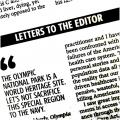
I WAS interested to read that Peter Kyle MP has had hundreds of derogatory messages about his spelling and has felt it necessary to publicly declare his dyslexia.
The NHS website states about 10 per cent of people have some degree of dyslexia. Peter's description suggests his condition was pretty restricting until it was diagnosed and he understood how to plan strategies to live with it.
As his life has demonstrated, being dyslexic does not mean you are not intelligent and need not hold you back in your chosen field of work.
Richard Branson, Walt Disney, and Albert Einstein are good examples.
Indeed, dyslexia and other "neurodiversities" are often associated with areas of weakness which we "normal" people focus on, but they also often have areas of amazing strength which just need recognising and fostering to enrich all our lives.
When I was advising employers about staff who struggled to work in conventional ways because of dyslexia, I would often recommend they look at the information provided by the Trade Union Congress and Acas on their websites, as well as the NHS.
A local (and national) organisation called Genius Within specialises in assessing neurodiverse adults in the workplace and facilitating appropriate support.
If you struggle at work because of dyslexia, talk to your manager, HR, or Occupational Health about any reasonable adjustments which might help you to perform better.
Play to your strengths!
Dr Steve Waters, Saltdean



Comments: Our rules
We want our comments to be a lively and valuable part of our community - a place where readers can debate and engage with the most important local issues. The ability to comment on our stories is a privilege, not a right, however, and that privilege may be withdrawn if it is abused or misused.
Please report any comments that break our rules.
Read the rules hereLast Updated:
Report this comment Cancel